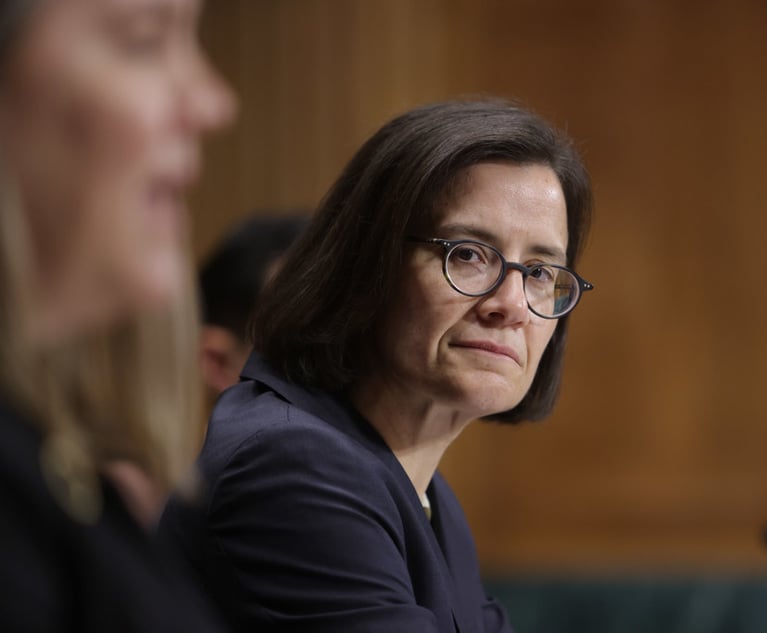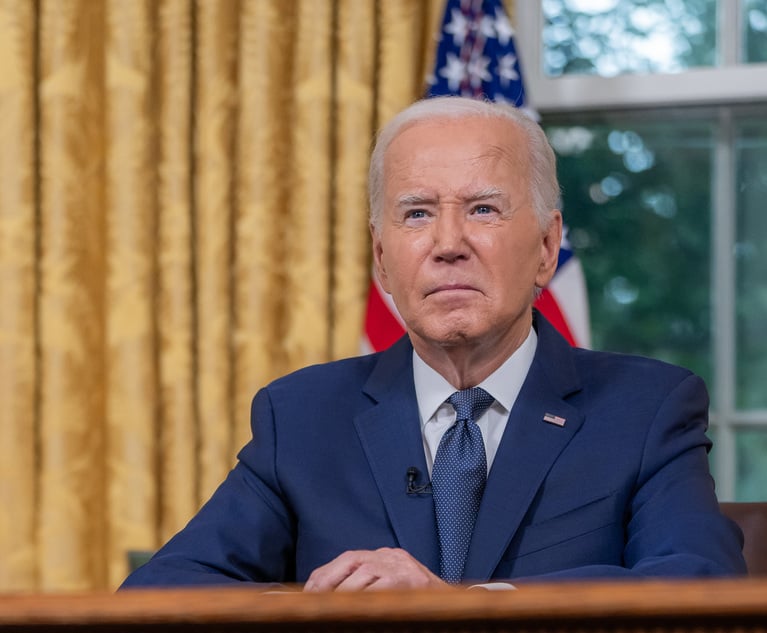 Minneapolis, Minnesota. Photo: Shutterstock
Minneapolis, Minnesota. Photo: ShutterstockMinnesota Supreme Court Backs Paid Sick Time Requirement
Municipalities have "wide discretion" to use their police power to regulate matters of public health, Justice Natalie Hudson wrote for the majority.
June 10, 2020 at 07:20 PM
5 minute read
Advocates for workers' rights welcomed a ruling from the Minnesota Supreme Court on Wednesday upholding a Minneapolis ordinance requiring sick pay.
The state's high court ruled 5-2 that a city of Minneapolis ordinance governing employee sick and safe time does not pose an irreconcilable conflict with state law, and state law therefore does not preempt the local rule. The court also said the city's law does not violate the extraterritoriality doctrine because the primary purpose and effect of the ordinance is to regulate sick and safe time for employees who work within the geographic limits of Minneapolis.
The opinion shuts down a Minnesota Chamber of Commerce effort to block the ordinance.
"We do not agree that the state statutes cited by the Chamber expressly permit what the ordinance forbids," Justice Natalie Hudson wrote for the majority. "We have not found an irreconcilable conflict between a municipal regulation and state law based on implied statutory permission. Instead, we look for express language of permission in a statute."
Justices Barry Anderson and Lorie Gildea dissented.
The Minneapolis Sick and Safe Time Ordinance requires employers to provide sick and safe time to employees who work within the city. "Employees can use sick and safe time for their own mental or physical illness, for the care of a sick family member, for an absence due to domestic violence or sexual assault, or for workplace or school closures due to emergencies," Hudson said.
The dissenters took issue with Hudson and sided with the chamber over the city's authority to regulate employers based outside Minneapolis. "Respondent city of Minneapolis passed an ordinance that requires employers to provide paid leave time to any employee who performs work within the city. Because the effects of this ordinance extend beyond the borders of Minneapolis, in violation of the extraterritoriality doctrine, I respectfully dissent," Anderson said, with Gildea concurring.
The case was closely watched, with amicus briefs filed on both sides. Groups that supported the city cheered the ruling Wednesday.
"Today marks another historic victory for workers and local democracy in the Twin Cities," said a joint statement from three amici: Sherry Leiwant, co-founder and co-president of A Better Balance; Kim Haddow, director of the Local Solutions Support Center; and Rebecca Dixon, executive director of the National Employment Law Project. "Against the backdrop of COVID-19, it is more important than ever that workers are able to take time off to care for their health and that of their loved ones without losing wages, which is exactly what the paid sick time law allows for."
They said the ruling will help as many as 100,000 employees in the city who previously lacked even a day of paid time off, and that it is "particularly important for Black, Latinx, and other workers of color—who are less likely to have access to paid sick leave, and for whom the consequences of that lack of paid time off are especially severe, compounding racial inequities in access to wealth and other economic supports."
They said the decision allows Minnesota to join "more than 35 cities and counties across the country —including St. Paul and Duluth—that have passed local paid sick leave protections."
"Minneapolis will continue to stand as a model for how cities can support a worker-led vision for a more just and successful economy," they said.
The winning legal team included: Sarah McLaren, Sara Lathrop and Susan Segal of the city attorney's office.
"The city is very pleased that the court ruled that the city had the authority to provide this basic protection for working people," City Attorney Erik Nilsson said in an email.
Christopher Larus and George Ashenmacher of Robins Kaplan represented the chamber.
"The Supreme Court's upholding of Minneapolis' policy is a blow to all employers in Minnesota," Minnesota Chamber of Commerce president Doug Loon said in an email. "Benefit packages are designed as uniquely as the employees they are meant to attract. One city unilaterally deciding workplace policies—inside and outside their borders—is a significant burden and just plain overreach. The patchwork approach impedes economic growth and the legislature needs to reestablish its authority in upholding the boundaries of regulation."
Hudson pushed back on her dissenting colleagues' assertions in favor of the chamber's arguments.
"We note that the dissent offers several hypotheticals to demonstrate the 'extraordinary' reach of the ordinance. But the situations imagined by the dissent are extreme examples, and we decline to apply this court's extraterritoriality jurisprudence using hypothetical outliers," Hudson said.
She gave "real-life examples" cited by the city, such as the 2,000 janitors regularly working throughout Minneapolis, cleaning commercial office space like the Wells Fargo Center and the U.S. Bank Plaza.
"Many of these janitors work exclusively within Minneapolis, even though the cleaning services that employ them do not have physical office locations within the city limits. The dissent ignores these real-world examples in favor of speculation about enforcement scenarios that may never occur," Hudson said.
Municipalities have "wide discretion" to use their police power to regulate matters of public health, Hudson said. She concluded, "We will not overrule the city's use of its discretion to implement regulations intended to protect the health of those living and working within Minneapolis based on speculation and hypotheticals."
This content has been archived. It is available through our partners, LexisNexis® and Bloomberg Law.
To view this content, please continue to their sites.
Not a Lexis Subscriber?
Subscribe Now
Not a Bloomberg Law Subscriber?
Subscribe Now
NOT FOR REPRINT
© 2024 ALM Global, LLC, All Rights Reserved. Request academic re-use from www.copyright.com. All other uses, submit a request to [email protected]. For more information visit Asset & Logo Licensing.
You Might Like
View All
3rd Circuit Strikes Down NLRB’s Monetary Remedies for Fired Starbucks Workers

‘Not A Kindergarten Teacher’: Judge Blasts Keller Postman, Jenner & Block, in Mass Arb Dispute
6 minute read
Solana Labs Co-Founder Allegedly Pocketed Ex-Wife’s ‘Millions of Dollars’ of Crypto Gains
4 minute readLaw Firms Mentioned
Trending Stories
Who Got The Work
Michael G. Bongiorno, Andrew Scott Dulberg and Elizabeth E. Driscoll from Wilmer Cutler Pickering Hale and Dorr have stepped in to represent Symbotic Inc., an A.I.-enabled technology platform that focuses on increasing supply chain efficiency, and other defendants in a pending shareholder derivative lawsuit. The case, filed Oct. 2 in Massachusetts District Court by the Brown Law Firm on behalf of Stephen Austen, accuses certain officers and directors of misleading investors in regard to Symbotic's potential for margin growth by failing to disclose that the company was not equipped to timely deploy its systems or manage expenses through project delays. The case, assigned to U.S. District Judge Nathaniel M. Gorton, is 1:24-cv-12522, Austen v. Cohen et al.
Who Got The Work
Edmund Polubinski and Marie Killmond of Davis Polk & Wardwell have entered appearances for data platform software development company MongoDB and other defendants in a pending shareholder derivative lawsuit. The action, filed Oct. 7 in New York Southern District Court by the Brown Law Firm, accuses the company's directors and/or officers of falsely expressing confidence in the company’s restructuring of its sales incentive plan and downplaying the severity of decreases in its upfront commitments. The case is 1:24-cv-07594, Roy v. Ittycheria et al.
Who Got The Work
Amy O. Bruchs and Kurt F. Ellison of Michael Best & Friedrich have entered appearances for Epic Systems Corp. in a pending employment discrimination lawsuit. The suit was filed Sept. 7 in Wisconsin Western District Court by Levine Eisberner LLC and Siri & Glimstad on behalf of a project manager who claims that he was wrongfully terminated after applying for a religious exemption to the defendant's COVID-19 vaccine mandate. The case, assigned to U.S. Magistrate Judge Anita Marie Boor, is 3:24-cv-00630, Secker, Nathan v. Epic Systems Corporation.
Who Got The Work
David X. Sullivan, Thomas J. Finn and Gregory A. Hall from McCarter & English have entered appearances for Sunrun Installation Services in a pending civil rights lawsuit. The complaint was filed Sept. 4 in Connecticut District Court by attorney Robert M. Berke on behalf of former employee George Edward Steins, who was arrested and charged with employing an unregistered home improvement salesperson. The complaint alleges that had Sunrun informed the Connecticut Department of Consumer Protection that the plaintiff's employment had ended in 2017 and that he no longer held Sunrun's home improvement contractor license, he would not have been hit with charges, which were dismissed in May 2024. The case, assigned to U.S. District Judge Jeffrey A. Meyer, is 3:24-cv-01423, Steins v. Sunrun, Inc. et al.
Who Got The Work
Greenberg Traurig shareholder Joshua L. Raskin has entered an appearance for boohoo.com UK Ltd. in a pending patent infringement lawsuit. The suit, filed Sept. 3 in Texas Eastern District Court by Rozier Hardt McDonough on behalf of Alto Dynamics, asserts five patents related to an online shopping platform. The case, assigned to U.S. District Judge Rodney Gilstrap, is 2:24-cv-00719, Alto Dynamics, LLC v. boohoo.com UK Limited.
Featured Firms
Law Offices of Gary Martin Hays & Associates, P.C.
(470) 294-1674
Law Offices of Mark E. Salomone
(857) 444-6468
Smith & Hassler
(713) 739-1250









